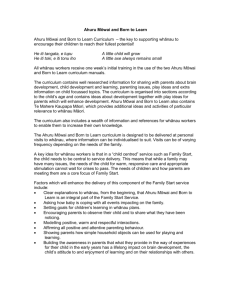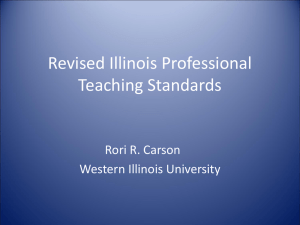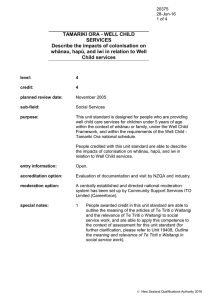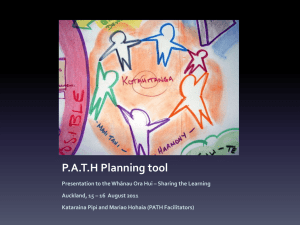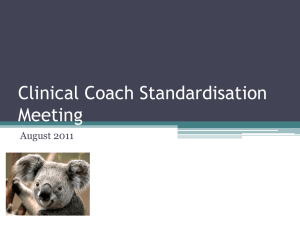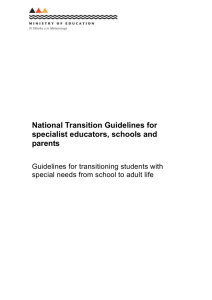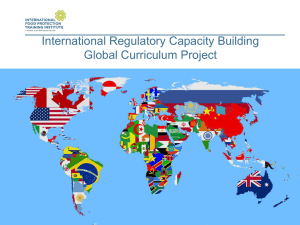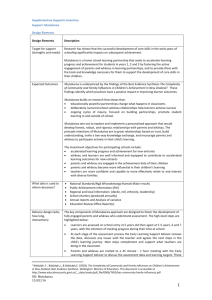Student Career Management Competencies
advertisement
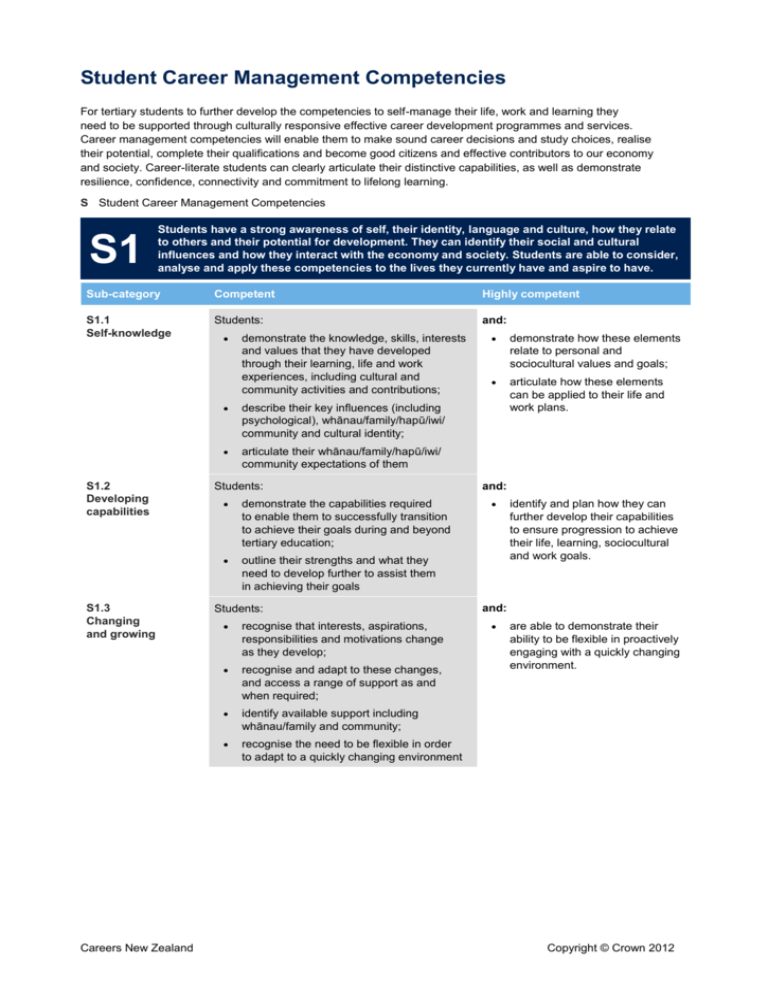
Student Career Management Competencies For tertiary students to further develop the competencies to self-manage their life, work and learning they need to be supported through culturally responsive effective career development programmes and services. Career management competencies will enable them to make sound career decisions and study choices, realise their potential, complete their qualifications and become good citizens and effective contributors to our economy and society. Career-literate students can clearly articulate their distinctive capabilities, as well as demonstrate resilience, confidence, connectivity and commitment to lifelong learning. S Student Career Management Competencies S1 Students have a strong awareness of self, their identity, language and culture, how they relate to others and their potential for development. They can identify their social and cultural influences and how they interact with the economy and society. Students are able to consider, analyse and apply these competencies to the lives they currently have and aspire to have. Sub-category Competent Highly competent S1.1 Self-knowledge Students: and: S1.2 Developing capabilities S1.3 Changing and growing Careers New Zealand demonstrate the knowledge, skills, interests and values that they have developed through their learning, life and work experiences, including cultural and community activities and contributions; describe their key influences (including psychological), whānau/family/hapū/iwi/ community and cultural identity; articulate their whānau/family/hapū/iwi/ community expectations of them Students: demonstrate the capabilities required to enable them to successfully transition to achieve their goals during and beyond tertiary education; outline their strengths and what they need to develop further to assist them in achieving their goals Students: recognise that interests, aspirations, responsibilities and motivations change as they develop; recognise and adapt to these changes, and access a range of support as and when required; identify available support including whānau/family and community; recognise the need to be flexible in order to adapt to a quickly changing environment demonstrate how these elements relate to personal and sociocultural values and goals; articulate how these elements can be applied to their life and work plans. and: identify and plan how they can further develop their capabilities to ensure progression to achieve their life, learning, sociocultural and work goals. and: are able to demonstrate their ability to be flexible in proactively engaging with a quickly changing environment. Copyright © Crown 2012 S2 Students can identify, evaluate and act on the opportunities available to them in life, learning and work. They are aware of the shifts in regional, national and global economies and society and their influence on their life, learning and work. Sub-category Competent Highly competent S2.1 Opportunity awareness Students are able to identify, create, act on and evaluate opportunities in life, learning and work that relate to their personality, culture, strengths, interests, aspirations, responsibilities and motivations by: and: S2.2 Life, learning and work realities S2.3 Accessing and using information making clear connections between their learning and opportunities; accessing networks that provide and assist with creating opportunities; realising their identity, language and culture are points of difference and strength; describing a diverse range of opportunities available beyond tertiary study Students are able to identify and evaluate: some of the realities and requirements of life, learning and work opportunities that relate to their identity and interests; the need for lifelong learning and the value of formal learning in developing their life skills; the impact of learning and work on their lifestyle; the contribution they can make to their whānau/family, hapū/iwi and society; an awareness of the need to be good citizens and effective contributors to a broader regional, national and global environment Students are able to: evaluate information from a range of sources, which includes technology, to explore their life, learning and work opportunities; understand that the dynamic nature of the labour market has an impact on life, learning and work plans; Careers New Zealand explain their criteria for identifying relevant and reliable information, and filter information appropriately making comprehensive connections between their learning and opportunities; accessing a range of networks that provide specialised opportunities; actively developing connections to people and organisations that can provide opportunities; prioritising and acting on the most appropriate opportunities. and: demonstrate how these realities relate to their own aspirations, motivations and personal circumstances; demonstrate how these can change over time due to influences of shifts in regional, national and global economies; understand the impact of learning and work on whānau/family and the wider community; realise the value of innovation and entrepreneurship in creating work futures. and: use information to examine and evaluate opportunities that could enhance their life and work plans (this includes identity, language and culture); interpret and analyse the impact of current education, training and work trends on their life, learning and work plans; realise that this information needs to be re-evaluated and added to in a continuous improvement loop; integrate this information into a thorough understanding of work-in-life. Copyright © Crown 2012 S3 Students make well-informed decisions as well as implement flexible life, learning and work plans. They are adaptable and responsive to change. They can find alternatives when faced with obstacles and have the resilience and ability to adapt as their life, learning and work environments change. Sub-category Competent Highly competent S3.1 Making life, learning and work decisions Students understand that: and: S3.2 Life, learning and work plans Careers New Zealand effective decision making is fundamental to creating the life that they wish to lead; apply a range of relevant decision-making strategies; life, learning and work decisions reflect a series of choices; there is a relationship among life, learning and work roles which can have an effect on decisions; identify the impact of their decisions on themselves and others; implement strategies to overcome identified obstacles; display a strong awareness of their own decision-making style, realise what works best for them in different situations and implement appropriate strategies; the decisions they make will have an impact on themselves and others, including whānau/family and community; they can find solutions to the obstacles they will face with regard to their life and work goals; chance and happenstance play an important role in their progress in life, learning and work; take advantage of the opportunities that arise as a result of chance and happenstance; they need to develop an awareness of strategies that increase resilience implement strategies that demonstrate resilience. Students: develop life, learning and work plans that satisfy and motivate them; use their plan to guide their decisions and actions; review plans as a result of experiences and feedback; manage their life/work/learning balance and: record, reflect on and amend plans in response to values, experiences, feedback and analysis of changing trends; demonstrate the ability to plan for the short, medium and long term; display the flexibility to change plans according to the need of any given situation. Copyright © Crown 2012 S4 Students develop and articulate their own personal and marketable identity which reflects their values, skills, training, knowledge and interests. This is evident in all communications that they share with the wider world, including prospective employers, broader networks and in online spaces. Sub-category Competent Highly competent S4.1 Developing a marketable identity1 Students: and: S4.2 Communicating synthesise their personal knowledge, life experience and understanding gained from their tertiary education towards the development of a marketable identity in order to maximise their potential; identify the connection between their identity and existing (or the development of new) opportunities Students: understand the importance of communicating their unique skills, abilities and cultural identity through a variety of currently relevant media to a broad audience; recognise the significance that positive attitude has on the process of seeking entry into the world of work; recognise the significance and appropriateness of their online profile/presence on the process of seeking entry into the world of work have developed a coherent and robust marketable identity in order to maximise their potential. and articulate a clear sense of their competitive edge, which includes: a strong understanding of their own special and distinctive capabilities (knowledge, skills, aptitudes and abilities); evidence of adaptation to complex demands; consistently displaying a positive attitude in work and learning contexts. 1 The set of skills, knowledge, attitudes and attributes that a student communicates to an audience in order to convey their competitive advantage and maximise their potential. This is not limited to specific work competencies, but may also encompass life experience and transferable skills. A student’s culture is a significant factor in this concept, as this will shape an individual’s sense of worth and self-awareness, which are the foundations of their marketable identity. Careers New Zealand Copyright © Crown 2012
